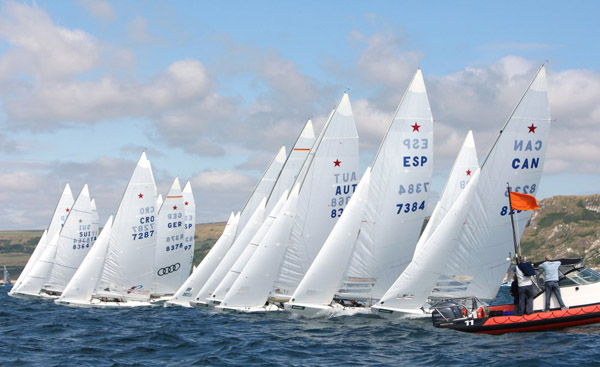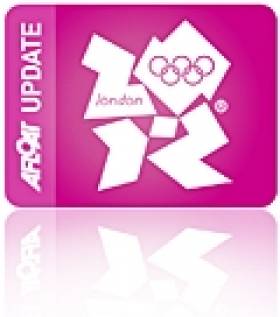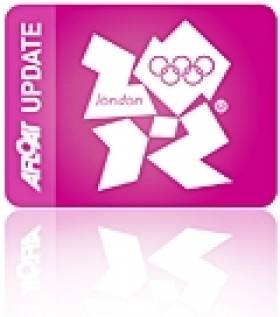Displaying items by tag: Frithjof Kleen
Irish Olympic Crews in Top Twenty of World Rankings
Peter O'Leary who has been sailing with three different crews, David Burrows, Frithjof Kleen and Timothy Goodbody to date is ranked 17th by the International Sailing Federation (ISAF).
O'Leary and Burrows sailing in the Star keelboat class were recent top finishers at 93-boat fleet in Miami. They finished second overall after they lost the overall lead in the last race of the 2011 Bacardi Cup.
Listen into a podcast about Peter O'Leary's Olympic sailing plans HERE.
Fellow Olympic squad member, 21-year old Annalise Murphy from Dun Laoghaire is now ranked 12th in the Laser radial class counting seven ISAF events. Murphy has also had success in Florida this season, she finished fourth in the Miami Olympic Classes regatta in January.
Listen to what Team Manager James O'Callaghan has to say about her progress:
The next release of the ISAF World Sailing Rankings will be on 13 April 2011 and will include the Trofeo SAR Princess Sofia Mapfre in Spain.
The ISAF World Sailing Rankings rate skippers based on their performances over the last two years. Skippers score points by competing in ISAF Graded events. The top finishers at all ISAF Graded events score Rankings points, with the highest points awarded to the event winner and then decreasing down relative to position.
More Irish Olympic Sailing News HERE.
O'Leary and Kleen Eight Points Clear in Weymouth
Royal Cork's Peter O'Leary and Frithjof Kleen have built an eight pont advantage to lead the Star class in Weymouth tonight. A fifth and a sixth were added to yesterday's stunning results (a first place after protest redress) in the 36 boat class that includes some of the world's top crews. Chasing the Ireland-German pairing is Swedish pair Frederick Look and Johan Tillander. Multiple Laser world champion Robert Sheidt of Brazil is seventh and Star Gold medallist Ian Percy of Britain is sixth. In another strong performance from an 11 member Irish squad is Annalise Murphy who is eighth in the Laser Radials. Results with Irish placings are below.

A tight start for the Star class. Peter O'Leary and Frithjof Kleen lead the 36-boat fleet in Weymouth. Photo: OnEdition
It was a day when the trapdoor opened - we're at the end of the opening rounds of Skandia Sail for Gold 2010. The Gold fleets will be separated out tonight, and tomorrow we get down to the business end of the regatta. If you went through the trapdoor into the silver fleet today, there's no way back. Meanwhile, at the top end the high-fliers from the first three days were roped up and hauled back into the pack – the leaderboard has got tighter almost everywhere.
If you want to see some seriously intense competition, look no further than the Women's 470 fleet. World Champions, Lisa Westerhof and Lobke Berkhout overhauled the Japanese pair of Ai Kondo and Wakako Tabata today – and they did it despite a black flag disqualification in the first race – going on to win the second. They say that champions are measured by their response to adversity, and if so, these two are real champions.
Westerhof said afterwards, "Everyone is sailing really up and down and the fleet isn't very consistent, apart from the Japanese who are having a good series. Although we haven't been consistent, we have managed to get to the top, but it doesn't feel like it. We have had an OCS (over the start line early) and finished 18th in a race on the first day, so we need to work on that, but the result at the minute is great."
Westerhof and Berkhout count two firsts and two seconds with that DSQ and 18th – but headline interest in this fleet goes further down the scoring list. Ingrid Petitjean and Nadarge Douroux lead French compatriots Emmanuelle Rol and Helene Defrance by one point in the the ISAF Sailing World Cup standings, and by just one place in the regatta – they are fourth and fifth.
We talked about three (other) French teams yesterday, all with exceptional leads in their fleets – and while all of them held onto those leads, it was a struggle. In the Men's 470, Pierre Leboucher and Vincent Garos scored a 12th and a second, and are now just two points ahead of Australian World Champions, Matt Belcher and Malcolm Page. And it's a hot Aussie breath on the back of French necks. "We're having a good regatta," said Belcher, "we got two seconds today and things are going well. Obviously we've won the [ISAF Sailing] World Cup and the World Championships, so it's been a great year and we never expected to be able to head into this event with the World Cup title wrapped up, so it's a great position to be in."
It the 49er, Frenchmen Manu Dyen and Stephane Christidis had recorded a 2, 2, 2, 1, 1 up to this morning, but today they could only add a third and an eleventh. The chasing Kiwis, Peter Burling and Blair Tuke, didn't fair much better with a second and a 14th, and now find themselves just one point ahead of both their cross-Tasman rivals, Nathan Outteridge and Iain Jensen, and the British team of Stevie Morrison and Ben Rhodes. The latter crew had an outstanding day with a first and a third, and Morrison said afterwards, "It wasn't very easy to make big gains, it was tough on the start and it was generally one sided, and pretty much down to boat speed". Clearly, the British pair weren't lacking in that commodity today.
In the Finn, the French high-flier yesterday was Jonathan Lobert, with a first and two seconds. But overnight, three of the major contenders, Ben Ainslie (GBR), Dan Slater (NZL) and Ed Wright (GBR) got awarded average points for yesterday's race, because of confusion over a change of course. The trio got those average points calculated on all their other races up to the end of today. So Ben Ainslie promptly went out and scored two seconds - hitting the kind of form that's won him more Finn bling than we can count. And so he's now up to second, 5.5 points behind Lobert...
The Skud-18 got back on the water today, after missing out yesterday when the breeze made sailing impossible. And Aussies, Daniel Fitzgibbon and Rachael Cox also had an outstanding day with three bullets to take a three point lead from the Brits, Alexandra Rickham and Nikki Birrell. Elsewhere there was another solid performance from Peter O'Leary and Frithjof Kleen in the Star. The early leaders, Kiwi America's Cup stars Hamish Pepper and Craig Monk, have faded badly to drop to ninth, leaving the Irish team clear by eight points from Swedes, Fredrik Loof and Johan Tillander.
In the Men's RS:X, Brit Nick Dempsey now leads overall after a great day, scoring a first and a second. Dempsey's agreed with his compatriot, Stevie Morrison (49er) about the start, "The difficult thing today was the starts, you could win or lose the race by the way you performed on the line so it was really important to ensure a safe start." And finally, we can't leave without a nod to the Laser Radial fleet, who were out there till late afternoon before they could get off the start line cleanly. No shortage of competitive athletes then, with Dutch girl, Marit Bouwmeester, now even at the top of the leaderboard with France's Sophie de Turckheim.
Results – Top Five - (results conditional on protests)
Star results – (After six races)
1st O'leary and Kleen IRL 19 points
2nd Loof and Tillander SWE 27 points
3rd Kusznierewicz and Zycki POL 29 points
4th Florent and Rambeau FRA 29 points
5th Polgar and Koy GER 30 points
Irish Interest
25th Max Treacy and Anthony Shanks 108pts
470 Woman Results (After six races)
1st Westerhof and Berkhout NED 24 points
2nd Kondon and Tabata JPN 25 points
3rd Pacheco and Betanzo ESP 30 points
4th Petitjean and Douroux FRA 33 points
5th Rol and DeFrance FRA 40 points
470 Men Results (After six races)
1st Leboucher and Garos FRA 8 points
2nd Belcher and Page AUS 10 points
3rd Mantis and Kagialis GRE 18 points
4th Fantela and Marenic CRO 20 points
5th Patience and Bithell GBR 21 points
49er Results (After seven races )
1st Dyen and Christidis FRA 11 points
2nd Burling and Tuke NZL 17 points
3rd Outteridge and Jensen AUS 18 points
4th Morrison and Rhodes GBR 18 points
5th Sibello and Sibello ITA 24 points
Irish Interest
15th Ryan Seaton and Matthew McGovern
43rd Ed Bulter and Ben Lynch
57th Alistair KIssane and Ben Scallan
Finn Results (After races)
1st Lobert FRA 14 points
2nd Ainslie GBR 19.4 points
3rd Scott GBR 26 points
4th Railey USA 27 points
5th Kljakovic CRO 30 points
Irish Interest
40th Ross Hamilton 196 points
Laser Results – (After 6 races)
1st Goodison GBR 13 points
2nd Murdoch NZL 19 points
3rd De Haas NED 20 points
4th Meech NZL 21 points
5th Slingsby NZL 24 points
Laser Radial Results (After races)
1st Bouwmeester NED 11 points
2nd De Turckheim FRA 11 points
3rd Steyaert FRA 12 points
4th Fenclova CZE 15 points
5th Van Acker BEL 15
Irish Interest
8th Annalise Muphy 28pts
51st Tiffany Brien 125pts
76th Saskia Tidey 141pts
RS:X Men Results (After six races )
1st Dempsey GBR 8 points
3rd Rodrigues POR 13
3rd Van Rijsselberge NED 14 points
4th Tobin NZL 15 points
5th Bontemps FRA 15 points
RS:X Women Results (After six races)
1st Manchon ESP 14 points
2nd Picon FRA 17 points
3rd Shaw GBR 29 points
4th Linares ITA 33 points
5th Tartaglini ITA 34 points
Women's Match Racing - Qualified for the Gold Fleet
Leroy, Riou and Bertrand FRA
Souter, Curtis and Price AUS
Macgregor, Lush and Macgregor GBR
Tunicliffe, Vandemer and Capozzi USA
Sally Barkow, Alana O'Reilly, Genny Tulloch USA
Renee Groeneveld, Annemieke Bes, Brechtje van der Werf NED
Repecharge Results so far...
Kjellberg SWE 3 - 0
Skudina RUS 2 - 1
Spithill USA 2 - 1
2.4mR Results – (After 6 races)
1st Damien FRA 7 points
2nd Schmitter NED 8 points
3rd Kol NED 13 points
4th Tingley CAN 25 points
5th Ruf USA 32 points
Skud-18 Results – (After 5 races)
1st Fitzgibbon and Cox AUS 4 points
2nd Rickham and Birrell GBR 7 points
3rd McRoberts and Hopkin CAN 12 points
4th Hovden and Millward GBR 16 points
5th Hall and Faulks GBR 20 points
Sonar Results – (After six races)
1st Hessels and Rossen NED 7 points
2nd Robertson and Stodel GBR 11 points
3rd Kroker and Prem GER 16 points
4th Cohen and Vexler 20 points (race 3 DNF)
5th Doerr and Freud USA 22 points































































